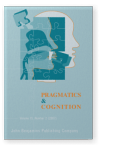Vol. 15:2 (2007) ► pp.229–251
Why irony sometimes comes to mind
Paradoxical effects of thought suppression
Research on the pragmatics of irony focuses on verbal irony use or on people’s ironic conceptualizations of external events. But people sometimes experience irony within themselves whenever conscious attempts to accomplish something (e.g., fall asleep, quit smoking, not think of a failed relationship) lead to completely contrary results (e.g., staying awake, having a stronger desire to smoke, constant thoughts about the failed relationship). These situations sometimes seem ironic and evoke strong emotional reactions precisely because people understand the incompatibility between what is desired and what has occurred, enough so that the idea of irony may pop into consciousness. Psychological research now reveals that the difficulty in suppressing unwanted thoughts is shaped by distinct “ironic processes of mental control”. This paper describes previous empirical evidence in support of this theory, suggests how this perspective explains why we occasionally recognize irony within ourselves, presents some new data on people’s ironic understandings of and emotional reactions to ironic events, and relates this new work within psychology to contemporary theories of situational irony.
Cited by (9)
Cited by 9 other publications
This list is based on CrossRef data as of 10 july 2024. Please note that it may not be complete. Sources presented here have been supplied by the respective publishers. Any errors therein should be reported to them.
